This week, the hearings were accompanied by members of the Association for Justice and Reconciliation (AJR) of the Kaqchikel region, Ancestral Indigenous Authorities of the Ixil region of Nebaj and various national and international civil society organizations.
Monday, April 8th, 2024
On the third day of hearings we heard the testimony of 3 witnesses, in which they recounted various massacres that occurred in Pexlá, Nebaj.
- Testimony of Juan Brito Lopez, 70 years old, from Pexlá:
During the arrival of soldiers to his community, he was forced to hide among the trees while he witnessed the burning of his house. Don Juan Brito lost his wife and 4 daughters, who were killed and burned on January 20. His daughters, ranging in age from 7 to 3 years old, were burned.
Subsequently, the soldiers rounded up all the men of the village and forced them to patrol, even without food, and he points out that there were other massacres in his community that day, including children and pregnant women.
He asks the court for justice and for these events not to be repeated.
- Testimony of Lorenza Santiago Raymundo, 75 years old, originally from Pexlá.
Doña Lorenza described a peaceful life before the arrival of the soldiers in her community, where they worked and were happy.
On September 15, soldiers killed her husband while he was looking for firewood. She finds her husband dead in a hole, with wounds in his chest and waist. Her husband was in a hole with three other people.
Subsequently, the soldiers burned her house, animals, crops, house and clothes. She and her children managed to escape.
- Testimony of Catarina Chel, from Pexlá, 87 years old.
Doña Catarina tells how 15 men were locked up and burned in a house. She stresses, “We don’t know if there were children, but when the soldiers left, those who had been in the house were ashes, charcoal.”
- Testimony of Jacinta Ceto Terraza
Finally, the witness Jacinta Ceto Terraza, native of the Pexlá village, was called, however, due to problems of acceptance of the witness, the hearing was postponed for April 9, 2024.
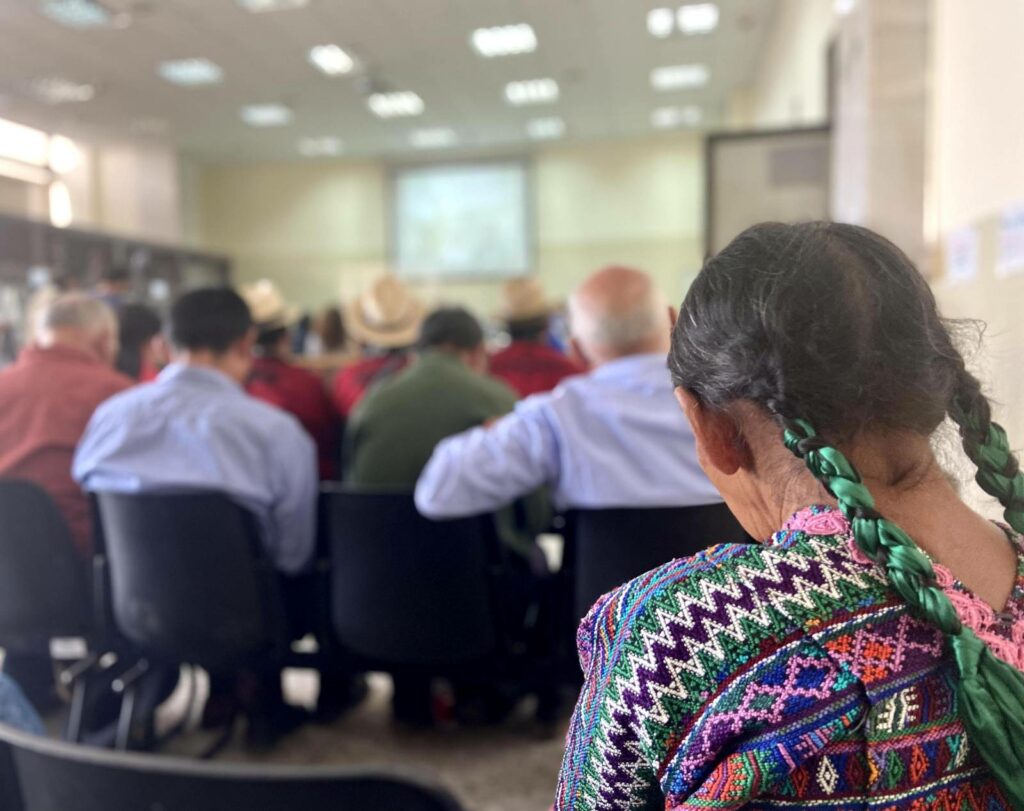
Photo by NISGUA. Ixil Genocide trial, Guatemala City, April 8th, 2024.
Tuesday, April 9th, 2024
- Testimony of María Avilés Torres, Jaq’ bintab, San Juan Cotzal
“The soldiers arrived in the community at about 5 a.m. and at about 6 a.m. they were already killing people, it was just dawn, but we were already dying at that moment.”
At my parents’ house, we were grinding corn to prepare breakfast when the soldiers arrived and I was able to hide behind some bushes. My mother stayed behind, along with 6 siblings, she was raped and killed, so were my siblings, and they were burned. That’s what the soldiers do, they don’t care about simple people. They burned our crops.
The soldiers grabbed my father, hung him from a tree and stabbed him. This was after the death of my mother and siblings. My father had gone out to work, to do harvest in another place near the town, and when he returned the soldiers grabbed him. My father was president of Catholic Action.
There were only two of us left, me and my younger sister. This happened on January 23 in the village Jaq’ bintab, San Juan Cotzal. Fernando Romeo Lucas García was the president at that time, and it was his soldiers who arrived, only he knows the reason why they killed the poor people. I want justice to be done, because they destroyed everything and we are poor.”
- Testimony of Juana Avilés Torres de Jaq’ bintab, San Juan Cotzal
(Sister of the first witness María Avilés)
“We were happy because we lived in our house and nobody bothered us. My mother and I made maguey twine and the whole family worked on a plantation.
At about 5 o’clock in the morning, I heard a bomb. I got scared and ran to my boyfriend’s house, so I managed to escape. My mother and my brothers were in the house, they burned it with them inside. My father was stabbed in the neck by soldiers. Six of my siblings died too, eight members of my family died that day.
I managed to get out, I went to my boyfriend’s house, that’s why I was saved. It was harvest time. My father had already harvested, but they burned everything, they left nothing.
I came back a week later to my burned house. I found bones, ashes, pieces of clothing. What compels me to come to testify today is the sadness I carry. I want justice to be done, I want the authorities to see that this does not happen again, especially since we are women, now I have children, I do not want this to happen to them. It is not possible that people who are leaders, kill us.”
- Testimony of Isabel Salic Sánchez, 65 years old, Jaq’ bintab, San Juan Cotzal
“There were 6 soldiers who took my father out of the house, dragging him, my mother followed him, she was screaming and crying. They killed my father first and then my mother on January 22, 1982. She was shot and the bullet came out of her chest. That day they also killed two brothers, a daughter-in-law who was pregnant was also killed, they were hiding in some bushes.
Afterwards, the soldiers burned the houses one by one, they left nothing behind.
The shooting started at 5 o’clock in the morning, I ran out with my brother to hide in the trees, but then the patrols took him to the military base and his body appeared in Pexlá, a year later.
When I returned to my community everyone was dead and the soldiers had left as well. We could not bury our relatives as we normally do in a box, we had to do it quickly because we were scared, we could only bury them with a cloth and plastic sheet. Currently, the exhumations have been done and they are now buried in a cemetery.
I ask the court for justice, everything we lived through makes us very sad, I am the only one left of my family, I don’t have anyone else, I don’t want this to happen again, nor to happen to my children”.
- Testimony of Jacinta Ceto, Pexla
“When the soldiers arrived we were scared because it was the first time we saw that, they were carrying firearms. I was in my house and the soldiers called my husband. The soldiers killed my husband with a machete at about 6 o’clock in the morning.
They set fire to him inside with us in the house. I told my mother to get out, even if they shot at us, and we managed to get out. But I could not get my husband’s body out. We took refuge in the mountains for one night. The next day we went to pick up his body and buried him with a sheet.
We don’t know why they attacked us. We had crops and they burned them, they took my chickens, we had cows and sheep that were lost, I had 4 acres of land, but they stole it and they burned the property document.
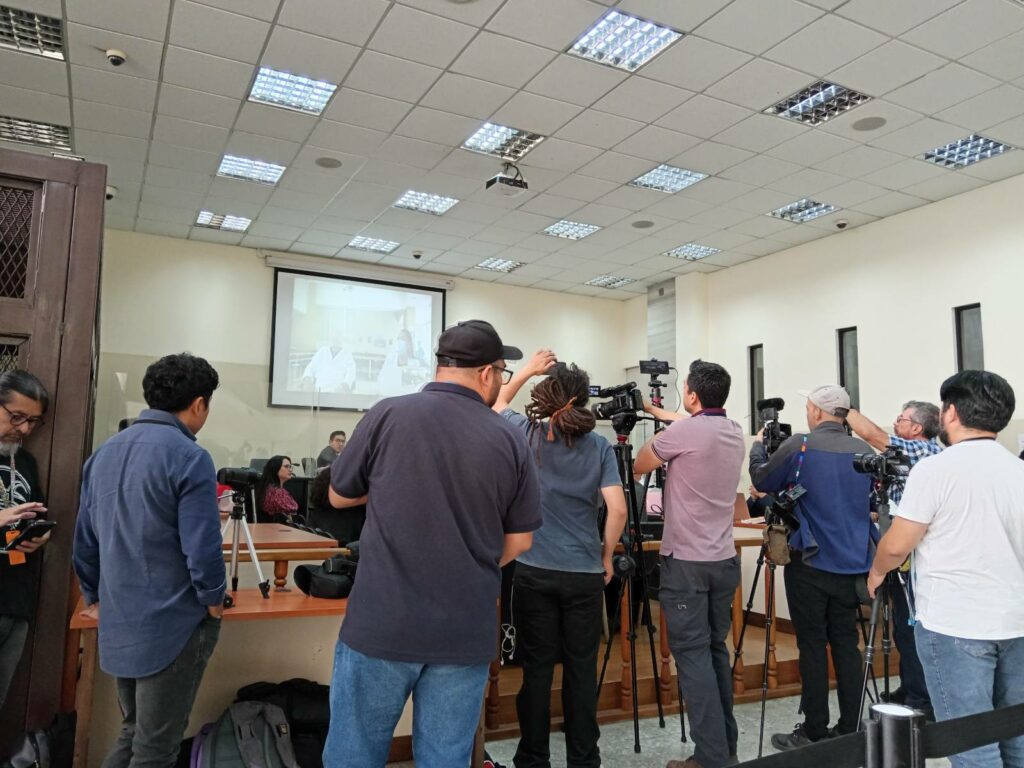
Photo by NISGUA. Ixil Genocide trial. Guatemala City. April 5th, 2024
Wednesday, April 10th, 2024
- Testimony of Diego Brito Raymundo, 62 years old
“Before the violence, we worked, we cut firewood, I took care of cattle, since I was 13 years old I started going to the plantations to work. When I was young, the milpa ceremony was held to ask for rain.
The day of the massacre a group of soldiers were killing people and another group was burning the houses. They were dressed as Kaibiles [Guatemalan army special forces]. They killed my father, grandmother, uncle and my son. I went to work that day, when I came back I found another uncle and he informed me of the killings. I was very scared, I managed to get in at 5 in the afternoon. I could not see how they killed them, because the bodies were burned, there was a lot of blood everywhere.
It was harvest time, and they burned the corn, the beans, the 4 cows and 35 sheep that we had were also lost.
My father did nothing wrong, they did not find a weapon on him. I am very sorry, and I ask that this does not happen again, because I have children, and I do not want what I experienced to happen again.
I buried my relatives right there, in my grandfather’s land, without ceremony because we were scared. My relatives have already been exhumed, and they are buried in the cemetery.
Nobody forced me to come, it is my right to testify. I ask that justice be done. We don’t want it to happen again, what we want is peace”.
- Testimony of Silverio Hernandez Sux, Xix, Chajul, 57 years old
“I was 13 or 14 years old in February 1982. Together with my father we went to work on a farm to cut reeds in Escuintla. In Xix, there were about 75 houses at that time.
That day, when approximately 20 soldiers entered his house, my father asked them please not to do anything to him, but they killed him with a knife. They also killed my mother and an uncle.
I could identify the soldiers from their uniforms, they also accused my dad in Spanish of being a guerrilla, but he was not. My dad was a worker, they showed their ID cards that they were workers, they insisted that they were not guerrillas, but the soldiers did not pay attention.
The soldiers burned the house. I managed to escape, otherwise they would have killed us all. They killed not only my father, but also other neighbors, my uncle who was the mayor of the community, a catechist from the Catholic church, and also pregnant women from the community, like my cousin Cristina, who had her baby ripped out of her womb.
That is why I am here to testify, I am telling the truth. We didn’t deserve that, neither did my father. That is why I ask the court to do justice. I was left with nothing. That is what happened in the community, everyone died, that is why I fled along with other people who fled. I went there to take refuge when the planes passed by.
Exhumations have also been carried out, and there you can also see that what I am saying is the truth. That is why I beg the honorable court to do justice for the massacre of our people, to take into account our petition. And it is not only me, there were many who died, I come to tell everything I saw, what I lived in our community”.
- Testimony of Diego Toma Aguilar Cajixay village, San Juan Cotzal, 65 years old
“Before the violence everything was fine. I was 11 when this happened, I was harvesting with my father, my mother, my brothers Manuela and Nicolas. The time for harvest was in January, although the date had passed, we went to another farm to harvest the corn.
We had already had lunch, it was about two o’clock when the army came down from Cunen, they called us and tied our hands behind our backs with string that we had. There were about twenty soldiers. My dad said we shouldn’t run, because we haven’t done anything, if they kill us, so be it.
One of the soldiers wanted to take the boots off my dad’s feet, my dad didn’t want to and the soldier hit him with his gun, he even threw him to the ground. My dad protested and the soldier shot him in front of me, I remember it very well. They wore hats and camouflage clothing, they had Galil rifles. I learned this when I was 15 years old, because the commissioners forced me to do military service and they took me to the military base of Santa Cruz del Quiche, military zone number 20.
After they killed my father, those of us who were minors were put in a kitchen made of straw, and from there I saw how the soldiers kicked my brother Nicolás. My mother cried and asked in K’iche’ for them not to beat her son, but they beat my brother for about an hour and beat him with their rifle butts. My brother was swollen, he could no longer hear what they were saying. And the soldier said to kill him, and I saw two soldiers go behind my brother with knives in their hands.
The soldiers raped the two young women who were also in the room. There were about 10 soldiers. They were Ixiles from the Cajixay village, between 19 and 24 years old. I was inside the kitchen and I saw everything, they were just crying. Both of them already had husbands.
The army stayed about two days in Cajixay, we managed to bury some members of my family in the land where my father was planting his corn, we couldn’t wake anyone up because the army was still in the village, so we just buried him and went to hide again.
I was crying, because I could not find what to do. A person helped me walk with him. We could hear the gunshots and we had to hide in the mountains. We could not use fires because the army was coming every few minutes. Three of my relatives have already been exhumed and buried in the Cotzal cemetery.
We looked for my mom all day but we couldn’t find her, and we had to hide again, because we felt that the army was already after us. To this day we don’t know what happened to my mother.
Whoever gave the order to kill my father committed a crime, my father is dead, and he can not recover, he died innocent”
The testimony of the survivors tells of the brutality suffered by their families and their community during the armed conflict in Guatemala, demanding justice and guarantees of non-repetition. As NISGUA we join these demands.
At the end of the presentation of the week’s witnesses we asked a representative of the AJR from the Ixil region to describe the process:
“For the moment the hearings are going well, but there have been difficulties. For example last Friday (April 5) people from the Ixil region came who are opposed to our struggle. It is not new, but we have to be attentive, because we know that the security of the witnesses is guaranteed in the capital, but in our communities and our homes, we still do not have security. It is not about being afraid, but we have to be very careful.
And on the other hand, the Ancestral Authorities of the Ixil region have accompanied us in the hearings, they are there, they also share this struggle, that helps us a lot and supports us. It is one more way to feel safe, since the authorities are recognized nationally and internationally, therefore the accompaniment of the Ixil Indigenous Authorities is very important.”
Representative of AJR, Ixil Region.
Photo by NISGUA. Ixil Genocide trial. Guatemala City. April 10th, 2024
Friday, April 12th, 2024.
The forensic expert Edy Armando Joaquín López was present and explained that his work was carried out due to the denunciations of the survivors who were looking for the recovery of the skeletal remains of their disappeared and murdered relatives.
He indicated that since clandestine graves had been found, they did not rule out the possibility that the remains found in them had been executed. This suggests a planned and selective attack. It was verified that the skeletons were burned. It was also verified that they had firearm wounds.
The forensic expert’s report confirms the massacre of 41 people in Aldea Pexlá, Nebaj, Quiché,. January 19 and 20, 1982. 29 female victims and 22 minors under 18 years of age between 6 months and 17 years.
The expert witness reiterated before the court the evidence of the massive and indiscriminate nature of the actions, executed strategically by elements of the Guatemalan Army between January 19 and 20, 1982. Likewise, the evidence demonstrates the strategy of intimidation and siege and the intention to disappear the population.

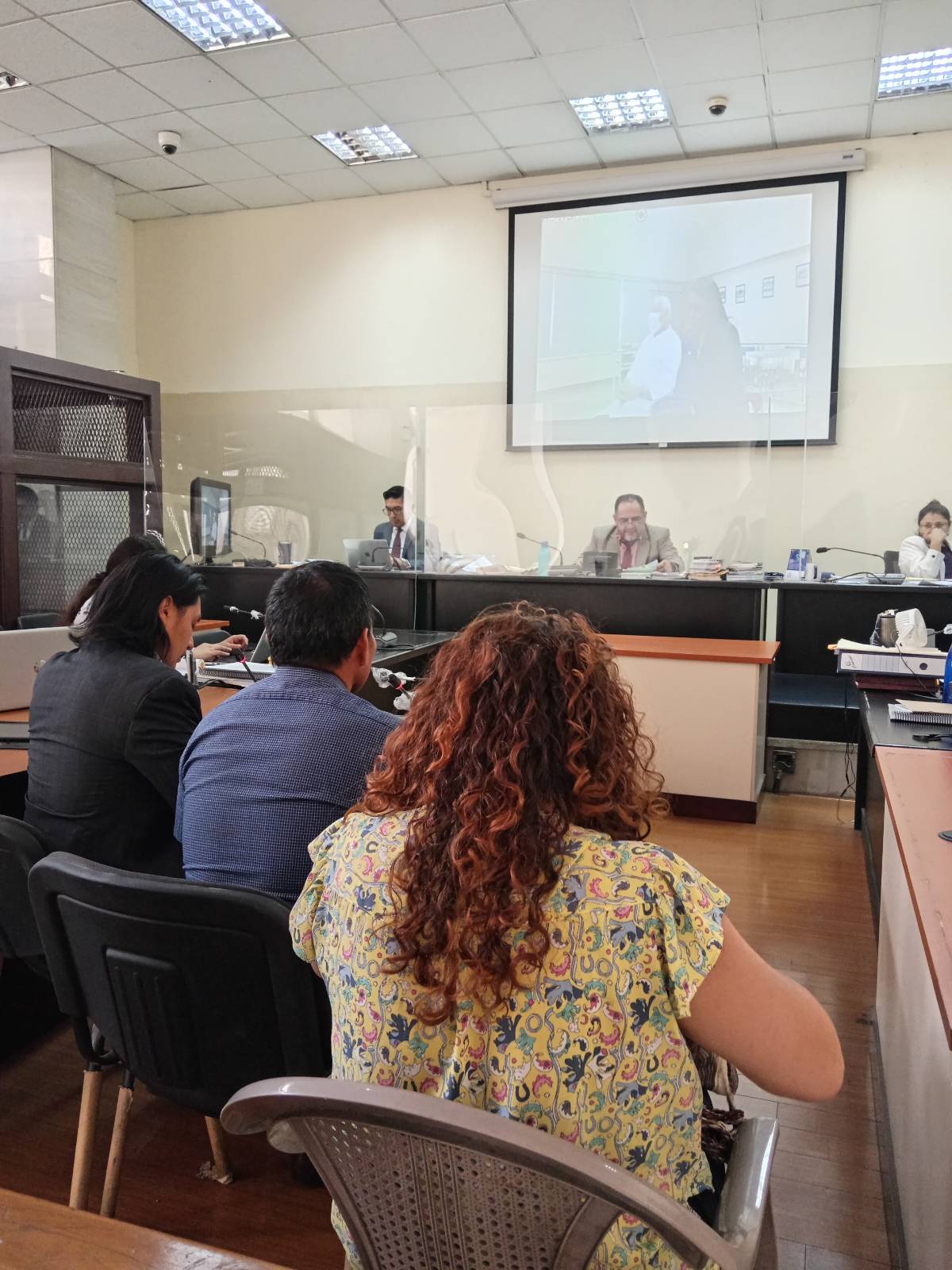
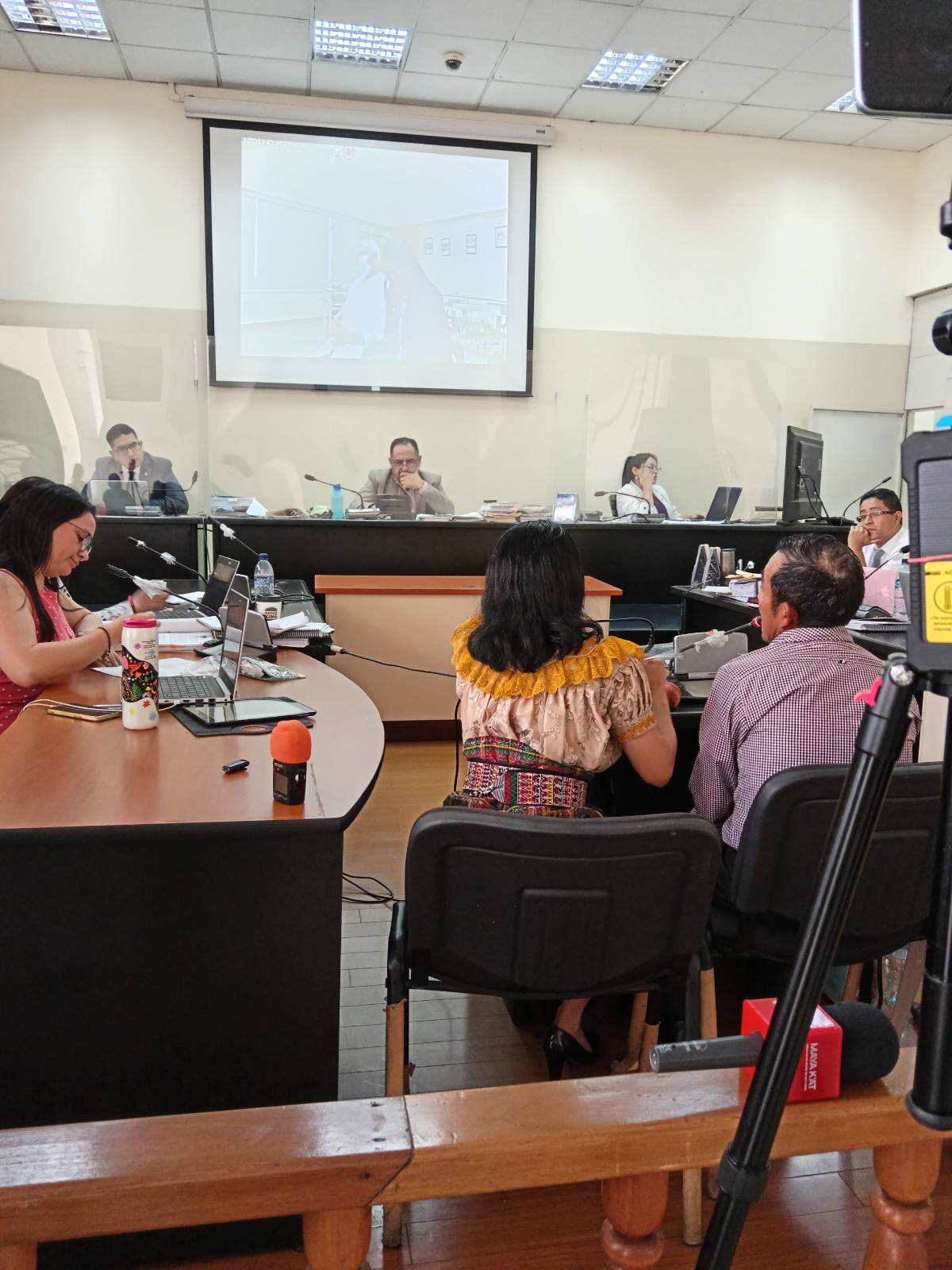
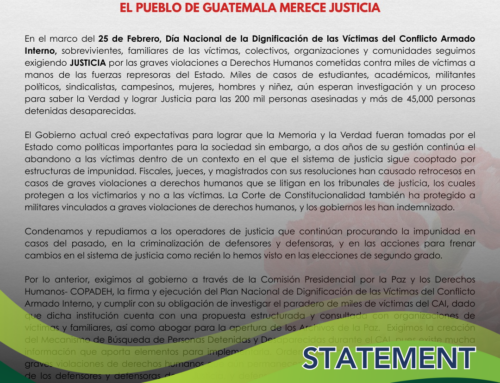



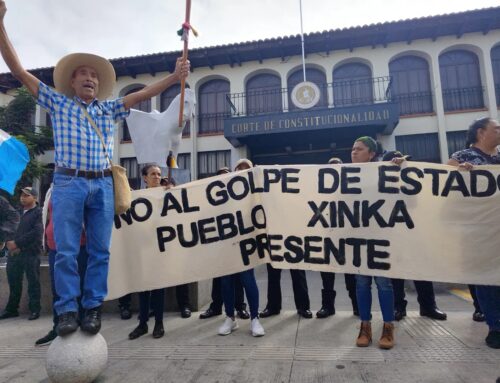
Leave A Comment